Did Ziad Rahbani leave a final will about his artistic production?

Vivian Haddad
The Middle East
Friends close to the late Ziad Al -Rahbani took a collective decision not to make any media statements about his death, so they committed complete silence towards this issue to be able to bid him farewell in their way. Their great sadness over the departure of the “teacher”, as they call it, lost them the ability to express a deep sadness that afflicted them. The friends of the late agree on many points around him, including what is related to his personality and another in his artistic school, and they remind him of a transparent, honest and bold person. Likewise, he is an artist who will not be repeated, as he took his writings and tunes as a means to build a country and a society that resembles him.
Obaido Pasha: “I expect to leave him a final will.”
The writer and playwright, Obaido Pasha, is one of the people who have a close relationship with the late Ziad Rahbani. He accompanied him for long periods and cooperated together in more than one art project, including “Tales”, which is the only album for children that Ziad signed in 1987.
Pasha was one of the people who accompanied Rahbani in the exercises on the play “For Bakra Show” in its second version. He intended to present it with a new template, but the country’s unstable circumstances at that time led him to cancel the idea.
Obaido Pasha tells Al -Sharq Al -Awsat aspects of the personality of the late artist. “We lived together a time period during which we would not separate. But we have moved away in the recent period. He was in severe depression, and he preferred to stay alone, and his health had began to decline significantly. ”
Obaido Pasha notes that he had wiped out from afar on a street in Beirut. “I did not dare greet him or approach him. He was significantly aware and fatigue. ”
He continues to Asharq Al -Awsat: “Ziyad prepared today to go to the Valley of Nom, just as the Roman fighters were road before they were burned. The brave does not die. And Ziyad was the only artist who dared and said matters. He did not hesitate to take positions that may be reflected in it with great losses. ”
Pasha believes that the actions of Ziad Rahbani are a metaphor for a proposal for a new social system, which he wanted to communicate through the word, the play and the tone. As if he was expressing his rejection of a prevailing social system. He presented the best alternative model through his artwork.
Obaido notes that Ziad has lived great suffering in his childhood. Its cause is due to the permanent tension between his father, Assi Rahbani and his mother, Fayrouz. “He was not calling them with Papa, Mama, but by turquoise and Asi.” This indicates a kind of distance that brings them and them. He suffered from permanent quarrels between them. Ziad admitted more than once that in his media conversations. When Assi was hardened by Fayrouz, Ziad was connected to the neighbors’ house, so he could sit with his father to moisturize the atmosphere between them. All of this undoubtedly affected Ziad and reflected negatively on his emotional relationships with women. He did not succeed in his relationship with Dalal Karam or with others. When he wrote the song “From Mara Lamara, I came back to Laura”, he was describing himself accurately.
Obaido Pasha concludes, speaking about a will that Ziad might leave before his departure. “I hope that his work will remain available to everyone, and that no official body will interfere with them. I believe that he left a final will related to the fate of these actions, and there are legal papers that he prepared in this regard. His lawyer has bought him for the last twenty years, and I think he arranged everything legally for after his death.
Rima Njeim: “No one understood the feelings of a woman like Ziad Rahbani.”
After the announcement of the news of the death of Ziyad Rahbani, the media, Rima Njeim, wrote, through her account on “Instagram”: “My heart was broken … We were reconciled before you left.” In an interview with Asharq Al -Awsat, Njeim tells her memories with Ziad, who had a friendship.
“The estrangement between me and him fell because of my love. Ziad was when he was tired, he becomes a harsh person, who is punished for depriving of communication. She tried to reconcile him, but he did not want the response, and since a period of isolated from people because of his illness. It is already one of the people who love loneliness. This time, his isolation came as a result of two critical health and psychological state. ”
Njeim prepared to broadcast a dialogue with Ziad Rahbani several years ago. She promised her listeners on “Voice of Tomorrow” radio. It is – as you remember to Asharq Al -Awsat – a metaphor for a long session in which they talked about various topics. “We were at that time in lunch in the town of Dhour Al -Shweir, who he loved and lived in one of her homes. A young dialogue is the noise of dishes and spoons. Its day was not the technique of revising the sound available as today by artificial intelligence. This delayed the birth of this new dialogue. ”
Njeim notes that Ziyad is perhaps the only man after the late poet Nizar Qabbani, who understands the feelings of women to this extent, so he addressed her femininity and feelings remarkably. And he classified the woman as “single and permissible”, to distinguish between the female woman and those who have a masculine personality. When I asked him if he prefers a smart or beautiful woman, “he took me to another direction.” Njeim refers to Ziad’s recognition of his failure in his relationships with women. “I hope that people will one day discover the depth of Ziad intellectual related to women. Everyone did not take his words seriously in his plays and songs. This was what was disturbing him, and urged him to stop presenting theatrical works. Whoever wrote (my friend of God) is still a child, he must be a genius. But there is great suffering he lived, and a deep sorrow in his inhabited, and he was born with this genius. ”
Rima Njeim indicates that he once complained to her about his relationship with his mother and said to her: “Imagine that my mother Fairuz did not prepare for me a bondage sandwich.” I criticized him and said to him: “It is sufficient that she is Fayrouz, so why are you Because she is in the end my mother. ” “He was eager to live in a normal family between the atmosphere of a normal father and mother,” Njeim continues.
Talal Winter: “Ziad did not like deification”
“He left at the age of 69 after his struggle with the homeland,” says the journalist Talal Wathwaya, his friend Ziad Al -Rahbani. The suffering of the late artist is shortened with what is going on on the land of a homeland bleeding. Talal is one of the people who got to know Ziad closely. He conducted several media dialogues with him. He also wrote a book on it entitled: “The time of Ziyad … Qadish was in people.” It collected stories about people whose lives intersecting with Ziad’s life. He says that he chose them from this principle, even though among them is those who never recognized Ziad. On the reaction of Ziyad to the book at the time, a winter told Al -Sharq Al -Awsat: “He did not like deification, and that he was a symbolic personality. Fear from the book; Because its content gives the image he deserves. His characters deal with events, places and time, Ziad lived in the level of politics, economics and various conflicts.
On his relationship with the late artist, he remembers: “I got to know him in the time of the Lebanese War. We did not appreciate the importance of life as if we would live forever. We thought we would triumph over the war. Then, with our age, we did not realize that we realized that life is difficult, and it is going very quickly. Today I feel sorrow and nostalgia for these periods, because I see how people I know them leave one after another. ”
The post Did Ziad Rahbani leave a final will about his artistic production? appeared first on 961 tobay Lebanon today.
















